Zach Cregger’s horror debut will leave you guessing at every turn. Shocking, disgusting, and surprisingly funny, Barbarian is just the kind of film that should be released in the lead up to Halloween. If you’re in the mood to leave the theater thinking “what the hell just happened,” this should be at the top of your viewing list.

Barbarian opens with a scenario I didn’t even know I should be afraid of: a double-booked short-term rental. Tess (Georgina Campbell) arrives in Detroit for a job interview to find that Keith (Bill Skarsgard) has already moved into her Airbnb; he booked through a different site. After some polite coaxing, Keith convinces Tess that she should step inside while she sorts out other arrangements—their rental is in a rough neighborhood—before ultimately inviting her to take the bed while he takes the couch. Against her better judgment, Tess agrees. Keith, to his credit, is doing everything he can to make her feel at ease, including opening the complimentary bottle of wine in front of her so she can see there hasn’t been any tampering. The two start to relax and chat about relationships and jobs; there even seems to be some chemistry in the air. When Tess hears something go bump in the night, you may think you know what’s going on, but you’ll be wrong.
*Spoilers ahead! Seriously, if you haven’t seen the movie, stop reading; the twists and turns really make this film.*
Bill Skarsgard as Keith is perfect casting. When a young woman arrives alone to her rental in an unfamiliar city to find a strange man already inside, what could it be but a ploy to rape and/or murder her? Skarsgard is handsome enough to be a love interest, but just slightly off-looking enough to warrant suspicion. Add in his role as Pennywise in the recent remake of Stephen King’s It and his character gains an edge that has us questioning why he’s being so welcoming. So we cycle through the possibilities: Is he going to murder her? No, he seems like an all right kind of guy. Is the owner of the Airbnb going to torture them together like some sort of Saw scenario? Hmm…no, maybe Keith is going to murder her. Wait, is this a haunted Airbnb?
Tess makes it through the night and nails her interview, only to be chased up the street by a raggedy, unhinged-looking man upon her return to the apartment. In the process of making a hasty escape, she finds herself locked in the basement. The moment she gets locked in, the tension begins to rise; it gives way to white-knuckle suspense when she discovers a hidden door leading to an underground passageway with a grimy room at the end furnished with a stained mattress, an old video recorder, and a bucket. We don’t know exactly what she’s stumbled upon but the implications are enough to make Tess, and many female audience members, terrified.
When Keith returns from work and frees Tess from the basement, he is insistent that she’s overreacting and takes it upon himself to prove that there’s nothing to fear…but doesn’t return. It’s at this point that Tess reveals the most deliciously frustrating recurring plot point: she cannot walk away from someone in need of help. Even if it means walking through a second hidden door and down the steepest, creepiest set of stairs and risking her life to find Keith. Only for him to die before her eyes anyway. Poor Keith! We assume the worst of him and then he has his head bashed in by a giant, naked woman (Matthew Patrick Davis).

We are now ripped from Tess’s story to be introduced to Justin Long’s character, EJ. Long is excellent as a scummy director who’s lost his most recent project after sexual assault allegations were made against him. Suddenly without an income, he retreats to a home he owns in Detroit to prepare to sell it. Yes, EJ owns the Airbnb property we last saw Tess in. His ridiculousness and general lack of self-awareness serve as dark comedic relief—his excitement on discovering all the extra square footage in the secret tunnels under the house garnered plenty of laughs.
As The New York Times notes, Barbarian doesn’t make one strong political statement, but instead rolls in a variety of punchy comments, predominantly on the fears of women and, more specifically, the fears women have about interactions with men. The tunnels, it turns out, were built by an earlier owner, back in the early 1980s, when the neighborhood was still mainly white and well-funded—there’s a brief note on Reaganism here—to kidnap women and force them to have his children…and those children to have more children. Tess’s fears upon arriving alone to a rental with a strange man already inside, EJ’s history of sexual assault, the tunnels where women were imprisoned and raped, and the apathy of the police officers Tess pleads to help her all add up a larger theme of sexual violence.
Cregger explores the ways that men and women have traditionally been socialized; it is no accident that Tess is incapable of walking away from someone in need, even if sexual violence is a possibility due to some guilty feeling of responsibility. On the other hand, Keith takes on a performative macho protector-type role while EJ adopts an “every man for himself” attitude as masculine alternatives. While underground, EJ comes across the withered old man who built the tunnels and watches a tape of one of the assaults. He’s horrified and disgusted. We in the audience wonder, “Does he not understand the pain he himself has caused because it’s not this extreme and violent?” Later, in a moment of safety, he soliloquizes about being a bad person and wanting to be better. When the opportunity soon arrives for him to do better by a woman, he sacrifices Tess to save himself. Barbarian is a movie that makes a point to both subvert expectations and play into them.

Barbarian also explores how women are socialized to motherhood. The horrifying monster who smashes Keith’s head in is actually a daughter of the old kidnapping rapist. We imagine that her father hasn’t bothered to raise her and her mother was likely in no condition to do so either. It’s clear she is lacking all social skills, most language, and anything else we would consider to be “human”. All that’s left is a maternal “instinct” learned from an ’80s breastfeeding video. She is so desperate to experience motherhood that she kidnaps Tess and EJ so she can “care” for them (like forcing them to nurse from her very dirty breasts). She, perhaps, is the barbarian of the title (the title was originally just a placeholder, but when the storyline was finished Creggers felt it was fitting)—uncultured, wild, a foreigner to a civilized world. As she cradles Tess in the final scene, some may feel pity for her. Given no purpose except unattainable motherhood, she’s not a monster by choice. As Tess raises a pistol to the woman’s head, it feels like both a way to guarantee her escape and a mercy.
Barbarian, with its 102-minute runtime, isn’t a short film, but it spends so much time on its first act that the later parts of the movie feel rushed, especially the time spent in the tunnels. It was such an appalling reveal, I wish Creggers had milked it (pun intended) and shown more. The homeless man (who, as it turns out, was only trying to warn Tess about the kidnapper) reveals that the naked, wild woman “isn’t the worst thing down there.” That line geared me up to see some even more monstrous tunnel dwellers; I was a bit let down to realize that he was actually just referring to the old man’s moral monstrosity.
Cregger’s ability to combine cliches with surprises makes this movie feel fresh and even light, despite the extremely heavy subject matter. The plot holes (how did they manage to outfit that rock tunnel with electricity?) are all but forgotten as we’re taken on a wild and twisty ride. This is the type of movie you want to see in a theater; laughing, gasping, and covering your eyes with everyone else. As is evident by the length of this review, it is particularly plot heavy, which is a welcome contrast to the rise in arthouse popularity including films like The Feast and Lamb. Barbarian stands out among the horror releases of late.

